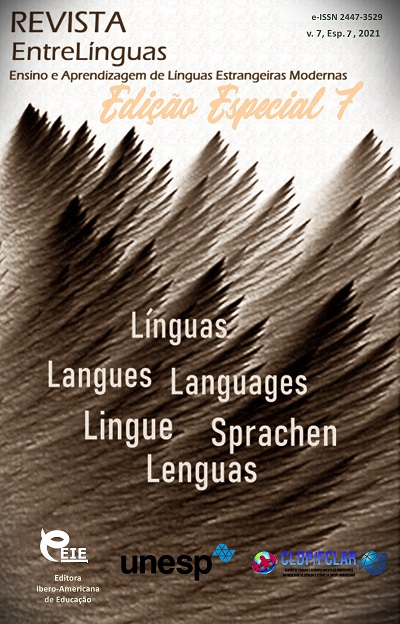Project of historical linguistics of slavic studies of 1958
DOI:
https://doi.org/10.29051/el.v7iesp.7.16269Keywords:
Slavic studies, Historical linguistics, National identity, HistoriographyAbstract
The article explores the paradoxes of methodology and political contexts of the project of historical linguistics of Slavic studies, which was officially declared during the IVth International Congress of Slavists (Moscow, 1958). The authors explore this significant project of historical linguistics from the point of view of intellectual history - through the problem of formation of ideas of researchers about the subject, method, and meta-language of Slavic studies, which has proved to be essential in the study of the history of this discipline. Semiotic analysis of the whole body of sources as a single text of ideology is utilized to attain the aim of the study. The project of historical linguistics of Slavistics (1958) is a fact of the history of discipline and ideology that reveals the relationship between the methodology of research and the practices of power and global projects to build national identity.
Downloads
References
Antonova, N.V., Myagkov, G.P., & Nikolaeva, O.A. (2019). Genesis problem of philosophical thought in spanish historiography”, Utopia y Praxis Latinoamericana, 24(5), 65-71.
Belov, M.V. (2007). At the origin of Serbian national ideology: mechanisms of formation and specifics of development: end of XVIIIth - mid-30s of XIX century, St. Petersburg: Aleteya, 540 p.
Bukharaev, V.M., Myagkov, G.P., & Nabiev, B.R. (2016). The philistine in Russian province at the junction of XIX and XX centuries: Modernization measurement”, Man in India, 96(3), 813-820.
Dyurishin, D. (1993). Problems of special interliterary communities, Moscow: Nauka; Vostochnaya literature, 264 p.
Lapteva, L.P. (2005). History of Slavic studies in Russia in the 19th century, Moscow: Indrik, 848 p.
Mayorova, O.N. (2001). Slavic Congress of 1867: The metaphors of celebration”, New Literary Review, 51, 89-110.
Nedashkovskii, L.F. (2009). Economy of the Golden Horde population. Anthropology & Archaeology of Eurasia, 48(2), 35-50.
https://doi.org/10.2753/AAE1061-1959480203
Nedashkovsky, L.F. (2012). Golden Horde Antiquities: The development of research ideas. Acta Archaeologica, 83(1), 225-255.
https://doi.org/10.1111/j.1600-0390.2012.00690.x
Nedashkovsky, L.F. (2014). Agriculture, Cattle Breeding and Trade in the Golden Horde Based on Data from Written Sources. Terra Sebus: Acta Musei Sabesiensis, Special Issue. Russian Studies. From the early Middle Ages to the present day, 291-303.
Nedashkovsky, L.F. (2015). Trade in the Golden Horde Volga Region”, Journal of Sustainable Development, 8(7), 199-206. https://doi.org/10.5539/jsd.v8n7p199
Nedashkovsky, L.F. (2016). Intensity of the economic development of the lower Volga region during the golden horde epoch (by the materials of the cities' environs). Stratum Plus, 6, 151-162.
Nedashkovsky, L.F. (2018). Chemical composition of non-ferrous artifacts from the Golden Horde settlements of the northern areas of the Lower Volga region. Stratum Plus, 6, 243-254.
Nedashkovsky, L.F., & Nedashkovskaya, N.I. (2016). The History of Study of Slavic Antiquities by the First University Slavists of Russia in the Context of Nation-Building Ideas Development. Man in India, 96(3), 719-726.
Nedashkovsky, L.F., & Nurkhamitov, M.R. (2019). Historical characteristics of the Golden Horde city. Opcion, Ano 35, Especial, 23, 288-302.
Nedashkovsky, L.F., & Shigapov, M.B. (2019). Arms and horse harness from Bagaevka settlement. Stratum Plus, 5, 167- 177.
https://doi.org/10.31857/S086960630008260-5
Nedashkovsky, L.F., Sitdikov, A.G., & Asylgaraeva, G.Sh. (2018). Ad memoriam A.G. Mukhamadiev (1933–2018). Povolzhskaya Arkheologiya, 2(24), 348-353. https://doi.org/10.24852/pa2018.2.24.348.353
Prokof’eva, N.A. (1980). International Commission on the History of Slavistics”, Slavic studies and Balkan studies abroad: Compendium of articles and materials, Moscow: Nauka, 34- 39.
Repina, L.P. (2012). National temperament’ and ‘the image of the other. Dialogue with time, 39, 9-19.
Sibinovich, M. (1995). Some topical issues of modern Slavistics”, Bulletin of the Moscow university. Series 9. Philology, 6, 21- 31.
Wolff, L. (1994). Inventing Eastern Europe: The Map of Civilization on the Mind of the Enlightenment, Stanford: Stanford University Press, 419 p.
Yagich, I.V. (2003). The history of Slavic philology: to the study of the discipline. Reprint of 1910, Мoscow: Indrik, 976 p.
Downloads
Published
How to Cite
Issue
Section
License

This work is licensed under a Creative Commons Attribution-NonCommercial-ShareAlike 4.0 International License.
Os manuscritos aceitos e publicados são de propriedade da Revista EntreLínguas. Os artigos publicados e as referências citadas na Revista EntreLínguas são de inteira responsabilidade de seus autores.
Transferência de direitos autorais – autorização para publicação
Caso o artigo submetido seja aprovado para publicação, já fica acordado que o(s) autor(es) autoriza(m) a UNESP a reproduzi-lo e publicá-lo na EntreLínguas, entendendo-se os termos “reprodução” e “publicação” conforme definição respectivamente dos incisos VI e I do artigo 5° da Lei 9610/98. O artigo poderá ser acessado pela rede mundial de computadores (Internet), sendo permitidas, a título gratuito, a consulta e a reprodução de exemplar do artigo para uso próprio de quem a consulta, desde que haja a citação ao texto consultado. Essa autorização de publicação 328 EntreLínguas, Araraquara, v. 1, n .2, p. 323-328, jul./dez. 2015 não tem limitação de tempo, ficando a UNESP responsável pela manutenção da identificação do(s) autor(es) do artigo. Os artigos publicados e as referências citadas na Revista EntreLínguas são de inteira responsabilidade de seus autores.











